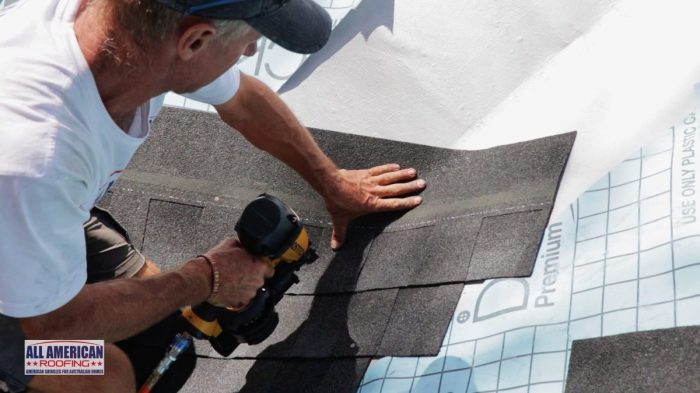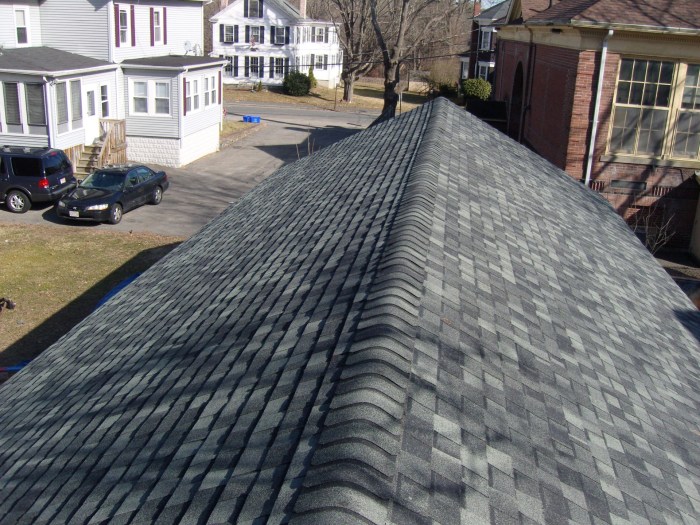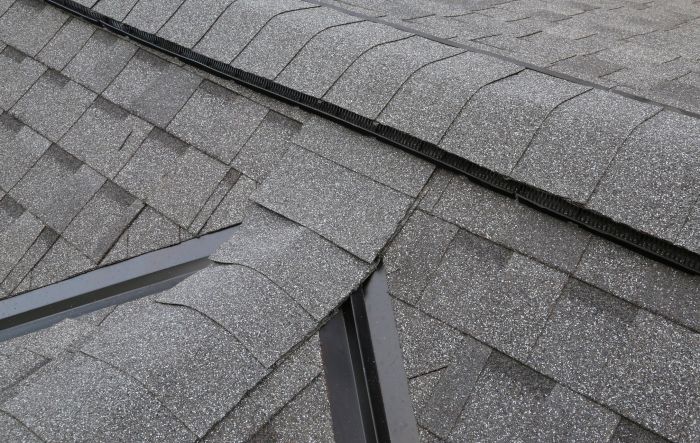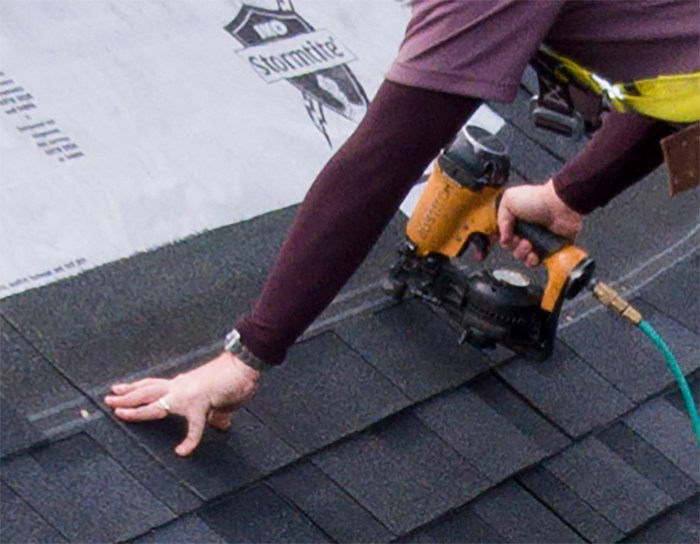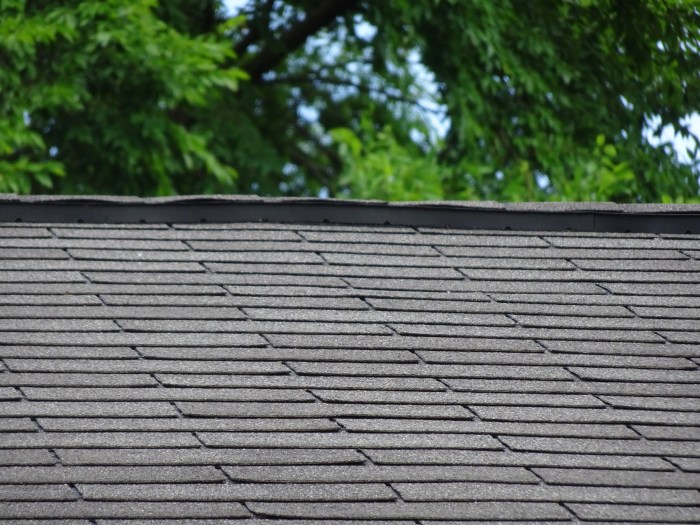Roofing Shingle Companies A Buyers Guide
Roofing shingle companies play a vital role in protecting our homes. Choosing the right company involves understanding shingle types, comparing warranties, and considering factors like price and environmental impact. This guide helps you navigate the market and find the perfect fit for your roofing needs, ensuring a long-lasting and reliable roof over your head. We’ll explore everything from shingle materials and manufacturer comparisons to crucial questions to ask potential contractors and how to spot a reputable company.
We’ll cover the different types of shingles available, their lifespans, and the factors affecting their cost. Also delve into the services offered by roofing companies, including installation, repair, and financing options. Understanding customer reviews and company certifications is key to making an informed decision, and we’ll show you how to do just that. Finally, we’ll walk you through the roofing process itself, from initial assessment to final installation.
Understanding the Roofing Shingle Market
The roofing shingle market is dynamic, constantly evolving with new materials, designs, and technologies. Understanding this market is crucial for both homeowners choosing new roofs and roofing contractors selecting materials for their projects. This section will break down key aspects of the roofing shingle market, focusing on material trends, shingle types, pricing factors, and lifespan comparisons.
Current Trends in Roofing Shingle Materials
Sustainability and energy efficiency are major driving forces in current roofing shingle trends. Homeowners are increasingly seeking eco-friendly options, leading to a rise in the popularity of shingles made from recycled materials or those designed to improve energy efficiency. Another significant trend is the demand for aesthetically pleasing shingles that complement modern architectural styles, resulting in a wider variety of colors, textures, and profiles. For example, the use of “cool roof” technology, which reflects sunlight and reduces energy consumption, is becoming more prevalent. Similarly, shingles incorporating recycled content are gaining traction as consumers become more environmentally conscious.
Types of Roofing Shingles
Several types of roofing shingles cater to diverse needs and budgets. Asphalt shingles remain the most common choice due to their affordability and ease of installation. These are further categorized into three-tab, architectural (dimensional), and luxury shingles, each varying in thickness, appearance, and durability. Other options include slate shingles, known for their longevity and elegant appearance, but significantly more expensive; clay tiles, offering exceptional durability and a classic aesthetic; and metal roofing, increasingly popular for its durability, longevity, and energy efficiency. Each type presents a unique balance of cost, aesthetics, and performance characteristics.
Factors Influencing Roofing Shingle Pricing
The cost of roofing shingles is influenced by several factors. Material composition is a primary driver; more durable and sophisticated materials naturally command higher prices. The shingle’s weight, thickness, and design complexity also contribute to the overall cost. Furthermore, manufacturing processes, brand reputation, and regional availability can influence pricing. For instance, luxury architectural shingles, often featuring thicker construction and enhanced durability, are considerably more expensive than basic three-tab asphalt shingles. Similarly, slate and clay tiles, requiring specialized installation techniques, typically incur higher labor costs, further increasing the overall project expense.
Lifespan and Durability Comparison of Shingle Types
The lifespan and durability of roofing shingles vary considerably depending on the material and quality. Asphalt shingles typically last 15-30 years, with architectural shingles generally outlasting three-tab shingles. Slate shingles boast an exceptionally long lifespan, often exceeding 100 years, while clay tiles can last for centuries with proper maintenance. Metal roofing also offers impressive longevity, lasting 50 years or more. These differences in lifespan directly impact the long-term cost of roofing, as more durable options require less frequent replacements. For example, while the initial investment in slate or metal roofing is higher, the extended lifespan can result in significant cost savings over the long term compared to frequent asphalt shingle replacements.
Identifying Leading Roofing Shingle Companies
The roofing shingle market is dominated by a handful of major players, each with its strengths and weaknesses. Understanding these companies, their offerings, and their market presence is crucial for both homeowners choosing new roofing and contractors selecting materials for their projects. This section will profile some of the leading manufacturers, comparing their warranties, geographic reach, and environmental impact.
Major Roofing Shingle Manufacturers and Market Share
Determining precise market share figures for roofing shingle manufacturers can be challenging due to the private nature of some company data and the dynamic nature of the market. However, based on industry reports and publicly available information, we can identify several key players. The exact percentages fluctuate yearly, but the following list represents a reasonable approximation of relative market size:
- CertainTeed: A consistently strong performer, CertainTeed holds a significant portion of the North American market, known for its wide range of products and established distribution network.
- Owens Corning: Another major player with a diverse product portfolio and extensive reach across the United States and Canada. They are often recognized for their innovative shingle technologies.
- GAF: A leading brand, GAF is widely recognized for its extensive warranty options and marketing efforts, holding a substantial market share.
- IKO: IKO has a strong presence, particularly in North America, and is known for its reliable and competitively priced shingles.
- Atlas Roofing: Atlas offers a variety of shingle types and is a significant player in the industry, particularly known for its focus on sustainability in some product lines.
Warranty Comparison of Roofing Shingle Companies
Warranty terms and conditions vary significantly between manufacturers. It’s vital to carefully review the fine print before making a purchase. Generally, warranties cover defects in materials and workmanship, but the length of coverage can differ greatly. Some companies offer extended warranties with additional purchase options, while others provide standard, shorter-term coverage. For example, GAF is known for its extensive warranty programs, including options that extend coverage for decades, while other companies might offer shorter, more basic warranties. Always compare the specifics of each manufacturer’s warranty before making a decision.
Geographic Reach and Distribution Networks
The major roofing shingle manufacturers maintain extensive distribution networks to ensure widespread availability. Companies like CertainTeed, Owens Corning, and GAF have a nationwide presence in the United States and Canada, with distribution centers strategically located to minimize shipping times and costs. IKO and Atlas Roofing also maintain broad distribution, though their geographic focus might vary slightly. The ease of access to specific shingle types can depend on location, so it’s wise to check with local suppliers for availability.
Environmental Impact of Roofing Shingles
The environmental impact of roofing shingles is a growing concern. Manufacturers are increasingly focusing on sustainable practices and the use of recycled materials. The following table provides a general comparison; specific environmental profiles can vary depending on the specific shingle type and manufacturing process. Note that this is a simplified overview and more detailed information can be found on each manufacturer’s website or through independent environmental assessments.
| Manufacturer | Recycled Content | Energy Efficiency | End-of-Life Options |
|---|---|---|---|
| CertainTeed | Varies by product; some lines incorporate recycled content. | Offers shingles designed for energy efficiency. | Information available on the website regarding responsible disposal. |
| Owens Corning | Utilizes recycled materials in some shingle types. | Focus on energy-efficient shingle options. | Information on recycling and disposal options available. |
| GAF | Some products incorporate recycled content. | Offers energy-efficient shingles. | Provides resources on responsible shingle disposal. |
| IKO | Information varies by product; check specific product details. | Offers energy-efficient options. | Details available on their website. |
| Atlas Roofing | Focus on sustainable manufacturing practices and recycled content in some products. | Offers energy-efficient shingles. | Information available on their website. |
Analyzing Company Services and Offerings
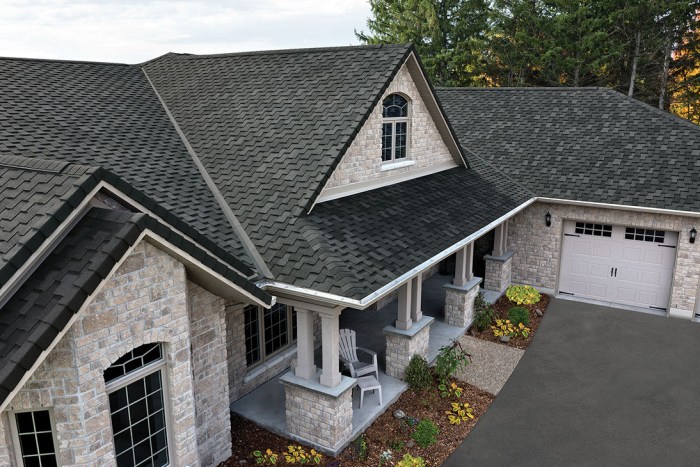
Source: iko.com
Choosing a roofing shingle company involves more than just comparing prices. Understanding the breadth of their services, financing options, and customer support is crucial for a smooth and satisfactory experience. This section will break down these key aspects to help you make an informed decision.
Range of Services Offered by Roofing Shingle Companies
Most reputable roofing shingle companies offer a comprehensive suite of services beyond simple shingle installation. These typically include roof inspections, repairs (for leaks, damaged shingles, etc.), new roof installations (using various shingle types), gutter cleaning and repair, and sometimes even skylight installation or replacement. Some companies specialize in certain areas, like emergency roof repair or the installation of specific shingle brands, so it’s important to check their expertise aligns with your needs. Larger companies might also offer warranties that cover both materials and workmanship, extending the lifespan of your investment.
Financing Options Provided by Roofing Companies
Financing plays a significant role in making a major home improvement like a new roof feasible. Many roofing companies partner with lenders to offer various financing options, such as low-interest loans, payment plans, or even zero-interest financing for a limited period. These options can break down the cost of the project into manageable monthly payments, making it more accessible to homeowners. It’s wise to compare the terms and interest rates offered by different companies before committing to a financing plan. Always review the contract carefully before signing. For example, one company might offer a 60-month loan at 5% APR, while another might provide a 36-month loan with 0% APR for the first year and a higher rate thereafter.
Customer Service and Support Provided by Various Companies
Excellent customer service is a hallmark of a reliable roofing company. Look for companies with readily available contact information (phone, email, online contact forms), prompt response times, and clear communication throughout the project. Reviews and testimonials are invaluable in assessing customer service. Positive reviews often highlight responsive project managers, skilled installers, and efficient cleanup after the job is complete. Conversely, negative reviews might point to communication breakdowns, unresolved issues, or lack of responsiveness to customer concerns. For example, a company with consistently high ratings on review sites like Yelp or Google Reviews often indicates a strong commitment to customer satisfaction.
Customer Testimonial Section for a Hypothetical Roofing Company Website
To showcase positive customer experiences, a hypothetical roofing company website could feature a dedicated section for testimonials. Each testimonial could include a customer’s name, location, a brief description of the service received, and a quote highlighting their satisfaction. For example:
“Apex Roofing did an amazing job replacing our old, leaky roof. Their team was professional, efficient, and cleaned up everything perfectly. We’re incredibly happy with the results and highly recommend them!” – Sarah M., Denver, CO
“We were impressed by the transparency and communication from start to finish. The financing options made the project affordable, and the quality of the workmanship is exceptional. Thank you, Apex Roofing!” – John B., Boulder, CO
“After a severe hailstorm, Apex Roofing responded quickly and efficiently to repair our damaged roof. Their emergency service was invaluable, and they went above and beyond to ensure our home was protected. We can’t thank them enough.” – Maria R., Littleton, CO
Exploring Customer Reviews and Feedback
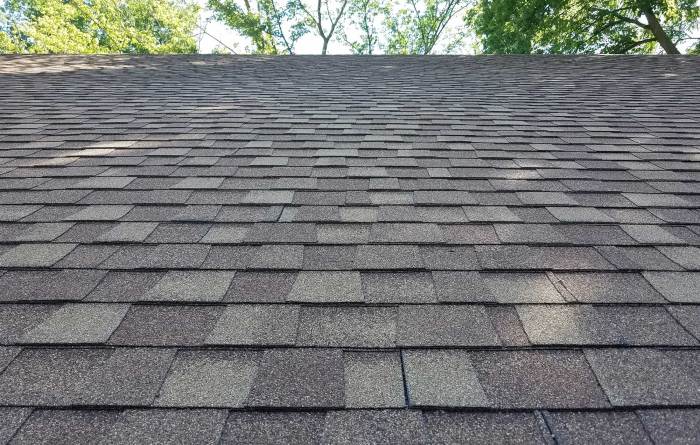
Source: roofright.com
Understanding customer reviews is crucial for any roofing shingle company aiming for success. Online reviews provide invaluable insights into customer perceptions, highlighting areas of strength and weakness, and ultimately shaping a company’s reputation. By analyzing this feedback, businesses can identify trends, improve services, and better meet customer expectations.
Analyzing online reviews reveals common themes customers discuss when evaluating roofing shingle companies. These themes often revolve around aspects of the entire customer journey, from initial contact to project completion and beyond.
Common Themes in Online Roofing Shingle Company Reviews
Customer reviews frequently focus on several key aspects. Positive reviews often praise professionalism, responsiveness, quality of workmanship, and the overall value received. Negative reviews frequently cite poor communication, scheduling issues, hidden costs, and unsatisfactory project outcomes. Neutral reviews might simply describe the experience as “okay” or “average,” lacking significant positive or negative details.
Factors Customers Consider When Choosing a Roofing Shingle Company
The decision-making process for choosing a roofing contractor involves careful consideration of various factors. Customers prioritize reputation and reliability, seeking companies with a proven track record and positive online reviews. Pricing and payment terms are also significant, with customers comparing quotes and payment options before making a decision. The warranty offered on materials and workmanship plays a vital role, providing reassurance and protection against future problems. Finally, the company’s communication style and responsiveness throughout the process greatly influence the customer’s overall satisfaction.
Questions Customers Should Ask Potential Roofing Contractors
Before hiring a roofing company, customers should proactively gather information. They should inquire about the company’s experience and licensing. A detailed explanation of the project timeline and process is also essential. Customers should ask about the materials used, their warranty, and the payment schedule. Finally, they should request references and verify the company’s insurance coverage. These inquiries ensure transparency and help customers make informed decisions.
Categorization of Customer Feedback
Analyzing customer feedback allows for a clear understanding of strengths and weaknesses.
- Positive Feedback: Includes comments praising excellent communication, timely project completion, high-quality workmanship, fair pricing, and professional conduct. For example, “The crew was incredibly professional and cleaned up meticulously after the job.” or “The price was competitive, and the quality of work was exceptional.”
- Negative Feedback: This category encompasses complaints about poor communication, delays in project completion, hidden costs, subpar workmanship, and unprofessional behavior. For example, “The contractor was unresponsive to my calls and emails,” or “The final bill was significantly higher than the initial quote.”
- Neutral Feedback: These reviews offer a balanced perspective, neither overwhelmingly positive nor negative. They might describe the experience as satisfactory but without significant praise or criticism. For example, “The job was done as expected, nothing special.” or “The roof looks fine, but the communication could have been better.”
Investigating Company Reputation and Certifications
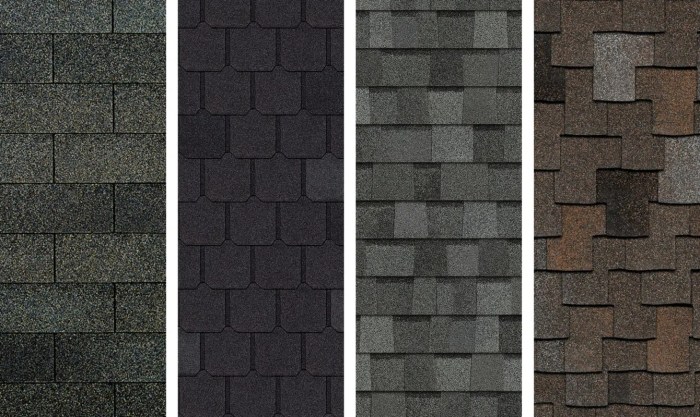
Source: cloudinary.com
Choosing a roofing company involves more than just comparing prices. A reputable company will have the necessary certifications and a proven track record, ensuring you get a quality roof and avoid potential problems down the line. This section focuses on how to verify a company’s legitimacy and ensure they’re the right choice for your roofing project.
Protecting your investment and ensuring the safety of your home requires thorough due diligence. It’s crucial to understand the significance of licensing, insurance, and industry certifications when selecting a roofing contractor. Failing to do so could lead to costly mistakes and potential legal issues.
Importance of Certifications and Licenses for Roofing Contractors
Licenses and certifications demonstrate a roofing contractor’s commitment to professionalism and adherence to industry standards. A valid license signifies that the company has met specific requirements set by the relevant state or local authorities, including background checks and proof of insurance. Certifications, on the other hand, show that the company and its employees have completed specialized training and passed rigorous exams, proving their expertise in specific roofing techniques or materials. This ensures higher quality workmanship and potentially longer warranties. Lack of proper licensing and certifications could indicate a lack of experience or disregard for regulations, increasing the risk of substandard work or legal disputes.
Examples of Reputable Industry Certifications and Associations
Several organizations offer certifications that signify a roofing contractor’s expertise and adherence to best practices. For instance, the National Roofing Contractors Association (NRCA) offers various certifications, indicating proficiency in specific areas like steep-slope roofing or low-slope roofing. Other reputable organizations include the Better Business Bureau (BBB) and local chapters of the Associated Builders and Contractors (ABC). Membership in these organizations often involves adherence to a code of ethics and a commitment to customer satisfaction. Checking if a company holds these certifications can offer valuable insights into their professionalism and dedication to quality. A high rating from the BBB also speaks volumes about a company’s history of resolving customer complaints fairly.
Verifying a Company’s Legitimacy and Insurance Coverage
Verifying a company’s legitimacy involves several steps. First, check their licensing information with your state’s licensing board. Their website usually provides a search function to confirm license validity and expiration dates. Secondly, request proof of liability and workers’ compensation insurance. This protection safeguards you from potential financial losses in case of accidents or damages during the roofing project. Insurance documents should clearly show the company’s name and policy details. Thirdly, you should always request references from previous clients. Contacting these clients allows you to gather firsthand accounts of the company’s work quality, professionalism, and responsiveness.
Researching a Company’s History and Track Record
Thoroughly researching a company’s history is crucial. Online reviews on platforms like Google, Yelp, and Angie’s List provide valuable insights into customer experiences. Pay close attention to recurring themes in the reviews – positive or negative. Look for patterns that indicate consistent quality or recurring issues. Furthermore, check the company’s online presence – a well-established and reputable company will typically have a professional website with detailed information about their services, certifications, and contact details. A lack of online presence or a poorly maintained website could raise concerns. Finally, search for any legal issues or complaints filed against the company. Online court records and government databases can provide information on past lawsuits or regulatory actions.
Visualizing the Roofing Process
Understanding the roofing shingle installation process is key to appreciating the quality of workmanship and the longevity of your new roof. This section will walk you through the typical steps, the tools used, and common types of roof damage that necessitate shingle replacement.
A typical shingle roofing installation project involves several key stages, each crucial for a long-lasting, weather-resistant roof. These steps, while seemingly straightforward, require skill and precision to ensure proper waterproofing and structural integrity.
Roof Structure and Shingle Layering
Imagine a roof’s framework as a sturdy skeleton supporting the protective shingle “skin.” This framework typically consists of rafters (angled beams supporting the roof’s weight), sheathing (plywood or OSB boards attached to the rafters creating a solid base), and underlayment (a waterproof membrane laid over the sheathing, providing an additional layer of protection against moisture). On top of the underlayment, the shingles are installed in overlapping rows, starting from the bottom edge (eaves) and working upwards. Each shingle layer is designed to overlap the previous one, creating a series of water-shedding planes. Think of it like laying bricks – each brick (shingle) overlaps the one below, preventing water from seeping through the gaps. A typical roof might have several layers of underlayment and then multiple courses of shingles, depending on the roof’s slope and the type of shingles used. The final layer is the visible shingles, creating the roof’s aesthetic appeal and weather protection. Along the edges, special starter shingles and ridge caps are used to ensure a neat and watertight finish. Valleys, where two roof slopes meet, also require specific techniques and materials for proper water drainage.
Specialized Tools and Equipment
Professional roofing contractors utilize a variety of specialized tools and equipment to ensure efficient and accurate shingle installation. These tools enhance safety and precision, leading to a higher-quality finished product. Common tools include roofing nails (specifically designed for shingle installation), a pneumatic nail gun (for faster and more consistent nailing), utility knives (for trimming and cutting shingles), chalk lines (for marking straight lines), measuring tapes, and safety harnesses. Larger projects may also involve the use of scaffolding, lift equipment, and specialized tools for handling and cutting specific shingle types. The use of proper equipment is not just about speed; it’s about ensuring a structurally sound and leak-proof roof.
Types of Roof Damage Requiring Shingle Replacement
Several factors can lead to shingle damage, necessitating replacement to maintain the roof’s integrity and prevent further deterioration. Common types of damage include: curling or cupping shingles (caused by sun exposure and age, leading to gaps and water penetration), missing or broken shingles (often due to impacts from debris or severe weather), granule loss (resulting in exposed shingle material, reducing its water resistance), algae growth (which can weaken shingles and affect their aesthetic appeal), and blistering or buckling (indicating potential moisture problems underneath the shingles). Each of these issues requires a different approach to repair or replacement, and a thorough inspection is crucial to identify the extent of the damage and determine the best course of action. Ignoring these issues can lead to more extensive and costly repairs down the line, including water damage to the interior of the building.
Concluding Remarks
Selecting a roofing shingle company is a significant decision, impacting both your home’s protection and your wallet. By carefully considering the factors discussed—shingle types, company reputation, warranties, and customer reviews—you can confidently choose a contractor who will deliver quality workmanship and excellent service. Remember to ask plenty of questions, compare quotes, and verify certifications to ensure a smooth and successful roofing project. Your new roof will be a testament to your diligent research and smart choice of contractor!
